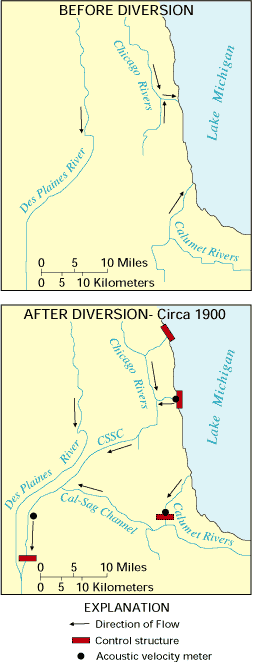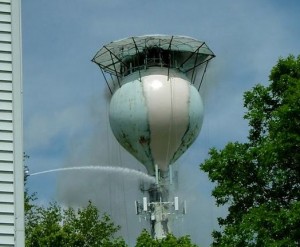The week that was, 5/30-6/5/2010
Posted on | June 6, 2010 | No Comments
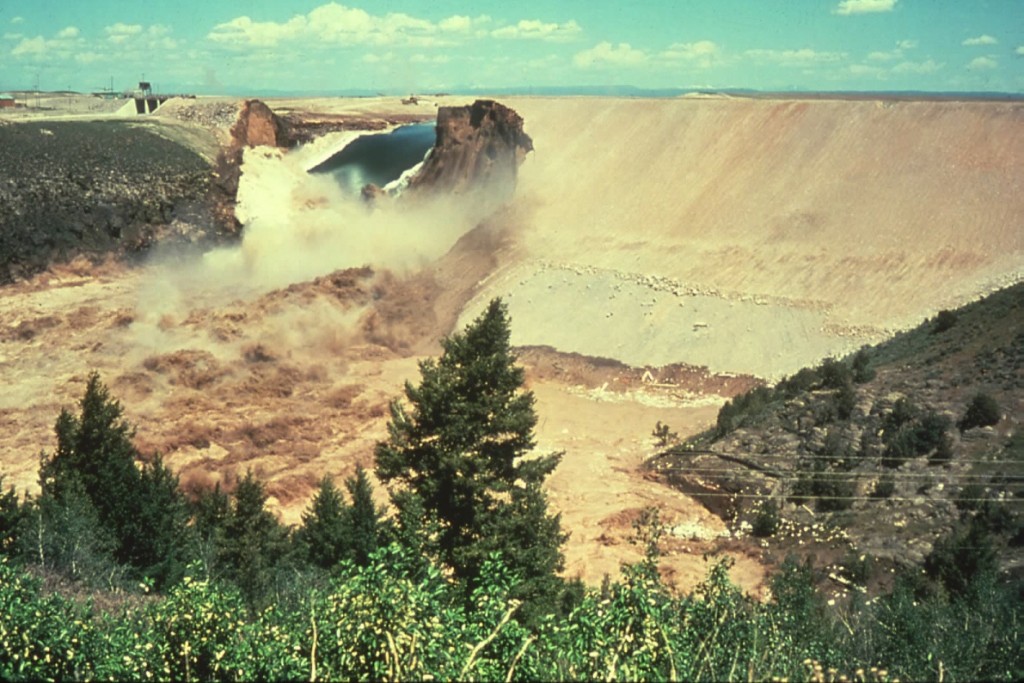
June 5, 2010 marked the 34th anniversary of the failure of Teton Dam. Click on the image for background from J. Davis Roger of the Missouri University of Science & Technology
Thirty-four years ago Saturday, eastern Idaho changed forever. The eight-month-old Teton Dam on the Teton River near Rexburg collapsed on June 5, 1976, drowning 11 people and 18,000 head of livestock and causing $2 billion in damage. — “Time to be blunt. The Teton dam won’t be rebuilt, nor should it be,” editorial in the Idaho Times-News, June 3, 2010
“The only matter that could take Egypt to war again is water.” — Anwar Sadat quoted in “War clouds gather as nations demand a piece of the Nile,” Times of London, June 4, 2010
Ethiopia this month opened the 460MW Tana Beles dam, which would have been considered an act of war in Sadat’s time. A string of new dams are planned to join the Beles on the Blue Nile. On the White Nile Uganda is opening the controversial Bujagali dam. — “Egypt warns that new Nile agreement could prove a ‘death sentence,'” The Independent, May 31, 2010 (Read this, it’s excellent. -ed)
...at least 472 million river-dependent people, some 8% of the world’s population, are estimated to live downstream of large dams and be affected by dam-induced changes in river flows and ecosystem conditions … — Achim Steiner, Former Secretary General of the World Commission on Dams; UN Under-Secretary General and Executive Director UN Environment Programme (UNEP), “WCD + 10: Revisiting the Large Dam Controversy,” Water Alternatives, June 2010

Elmer Avenue before retrofit. Source: Los Angeles and San Gabriel Rivers Watershed Council via LACF. Click on either image for a photo gallery of the project.
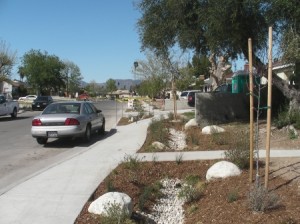
Elmer Avenue after retrofit. Source: Los Angeles and San Gabriel Rivers Watershed Council via LACF. Click on either image for a photo gallery of the project.
“I’ve never seen so many people taking such interest in water entering a storm drain.” — Joe Linton on the grand opening of the Elmer Avenue Neighborhood Retrofit Project, LA Creek Freak, June 3, 2010
The administration and Congress should require every state to craft a 50-year water plan. — From the op-ed “Obama should look forward on water,” Dallas Morning News, May 28, 2010*
“The corporations make the consumers responsible for recycling. They produce the containers, but don’t take responsibility for recycling the bottles.” — Octavio Rosas Landa, an economist at the National Autonomous University of Mexico, “In Mexico fear of tap water fuels bottled water boom,” McClatchy, May 30, 2010
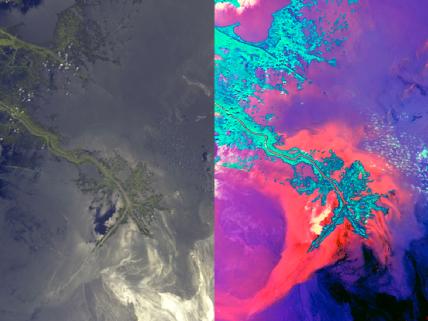
Two views of oil moving into Louisiana's coastal wetlands. Image Credit: NASA/GSFC/LaRC/JPL, MISR Team. Click on the images to be taken to a NASA photo gallery of the British Petroleum oil spill in the Gulf of Mexico
“I’m not too worried about oil on the surface. It’s going to cause very substantial and noticeable damage—marsh loss and coastal erosion and impact on fisheries, dead birds, dead turtles—but we’ll know what that is. It’s the things we don’t see that worry me the most. What happens if you wipe out all those jellyfish down there? We don’t know what their role is in the environment. But Mother Nature put them there for a reason.” — Louisiana State University professor emeritus Ed Overton, “What the spill will kill,” Newsweek, June 6, 2010**
Congress must pass the Fracturing Responsibility and Awareness of Chemicals Act of 2009 to help protect all rivers within the Marcellus Shale region. — Entry for the Delaware River, Number One on American Rivers’ list of 2010 America’s Most Endangered Rivers, June 2, 2010
Three decades ago, the mayor’s father, Mayor Richard J. Daley, occasionally mused about downtown workers being able to go down to the river during their lunch hour, catch a fish and cook it up along the bank. People laughed, until they realized he was serious. — “Obama, US EPA push for cleaner Chicago River,” Chicago Tribune, June 1, 2010
Making the Chicago River safe enough for swimming would waste taxpayer money and put children at risk of drowning … — Chicago Tribune, June 3, 2010
“Nothing that we use for five minutes should pollute the ocean for 500 years.” — Dan Jacobson, legislative director for Environment California, “Support for Bill to Ban Plastic Bags Continues to Grow,” LAist, June 1, 2010
“It’s astounding to think the Legislature is seriously considering creating a new $1 million bureaucracy to monitor how people choose to pack their groceries.” — American Chemistry Council spokesman Tim Shestek, “California advances grocery store plastic bag ban,” Christian Science Monitor, June 3, 2010
“It’s like Chinatown, on steroids.” — California Sportfishing Protection Alliance director Bill Jennings on the Monterey Agreement, “Lawsuit seeks return of millions for failed Delta protection plan,” Contra Costa Times, June 3, 2010
I love how audacious C-WIN is, and am glad they’re out there. They’re taking on the right issues, and often go straight to the heart of them … They may well be right that some of our big practices aren’t constitutional. But they are well ingrained. — “Get Judge Roesch if you can. That man fears nothing,” On the public record blog, June 4, 2010
Arsenic is so common in groundwater in Bangladesh, Nepal, western India, Myanmar, Cambodia and Vietnam — all heavily populated countries in the flood plains draining the Himalayas — that their drinking water has been called “the largest poisoning of a population in history.” — “Poisoned Wells: In Asia, Cutting Arsenic Risk in Water Through Well-Drilling Techniques,” The New York Times, May 31, 2010 (via Science magazine)
“In almost every village, it is a woman’s responsibility to provide water, whether as a mother or daughter.” — Linda Amalia Sari Gumelar, Indonesian Women’s Empowerment and Child Protection Minister, “Water Projects? Think of women, minister says,” The Jakarta Post, May 31, 2010
“We need to create more room for rivers to flood when the inevitable floods do come, instead of spending hundreds of millions on emergency levee repairs.” — John Cain, Director of Conservation for California Flood Management, American Rivers, “Delta second on list of waterways in peril,” The San Francisco Chronicle, June 2, 2010
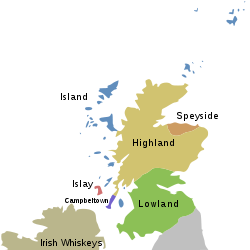 [Whisky] advertising often dwells on the highland or island provenance — images of pristine mountain streams abound, along with references to peaty flavors. References to recycled water are less common. — “In Scotland, regulating the “water of life,” New York Times, June 3, 2010
[Whisky] advertising often dwells on the highland or island provenance — images of pristine mountain streams abound, along with references to peaty flavors. References to recycled water are less common. — “In Scotland, regulating the “water of life,” New York Times, June 3, 2010Judge Wanger reframed the decision, writing, “This case involves both harm to threatened species and to humans and their environment. Congress does not nor does T.V.A. v. Hill elevate species protection over the health and safety of humans.” — Page 126-127, Finding of Fact and Conclusions Law, May 18, 2010 by Judge Oliver Wanger in the Consolidated Salmonid Cases, “The human equation in water disputes,” The New York Times, June 3, 2010
“The protection of water resources from interbasin transfers is a goal that is shared by the vast majority of Canadians.” — Ralph Pentland, acting chair the Canadian Water Issues Council, “University of Toronto Water Group says New Federal Proposal to protect Canadian water from Transfers Effective if Strengthened,” June 3, 2010
“You can’t vote for rain.” — Bill Maher, Real Time with Bill Maher, HBO, June 4, 2010
Water towers are important because they create pressure to keep water flowing through the pipes that serve customers. — Tom Heikkinen, Madison Water Utility director, “Fire may have damaged water tower beyond repair,” Wisconsin State Journal, June 2, 2010
“… the water tower is leaking like a sieve.” — Dublin politician Keiran Dennison, “French experts called in to help fix €2.7m ‘leaking’ tower,” Irish Sunday Tribune, June 6, 2010**
*From week before last
**From The week that is
Comments
Leave a Reply
